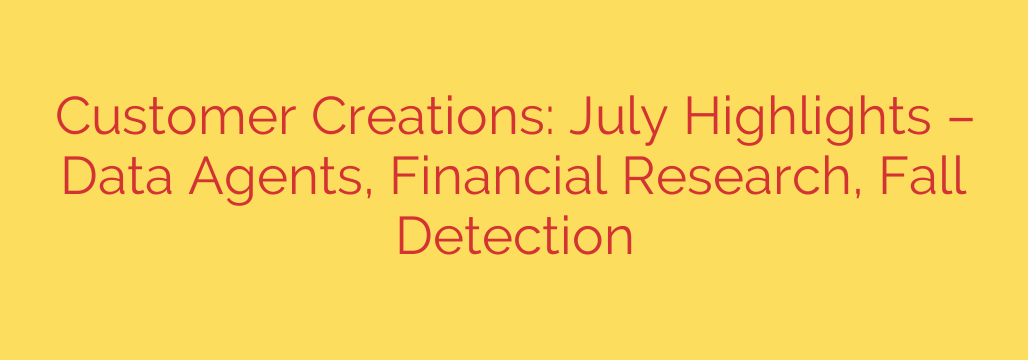
Transforming Industries: 3 Groundbreaking AI Applications You Need to Know About
Artificial intelligence is rapidly moving beyond theory and into practical, real-world applications that solve complex problems. From simplifying data analysis to enhancing personal safety, AI-powered tools are creating new efficiencies and capabilities across a wide range of fields.
Let’s explore three innovative examples of how AI is making a tangible impact today.
1. The Rise of Intelligent Data Agents: Your Personal Data Analyst
For years, accessing and interpreting company data has been the domain of specialized analysts who can write complex SQL queries. This bottleneck often slows down decision-making and keeps valuable insights locked away from the teams that need them most.
Intelligent data agents are changing this paradigm entirely. These AI-powered tools connect directly to a company’s databases and allow users to ask questions using plain, everyday language.
Instead of writing complicated code, a marketing manager can simply ask, “What were our top-selling products in the Midwest last quarter?” or “Show me the customer churn rate for our premium subscription tier over the past six months.” The AI agent understands the request, queries the database, and returns a clear, accurate answer in seconds.
Key benefits of this technology include:
- Democratizing data access: It empowers non-technical staff to perform their own data analysis without extensive training.
- Accelerated decision-making: Teams can get immediate answers to critical business questions, allowing them to adapt and strategize more quickly.
- Increased efficiency: By automating routine data pulls, these agents free up data scientists and analysts to focus on more strategic, high-value work.
This approach effectively gives every employee a personal data analyst, making organizations more agile and data-driven from the ground up.
2. Revolutionizing Financial Research with AI
The world of finance is built on information, but analysts are often overwhelmed by the sheer volume of it. A single company can generate thousands of pages of documents, including earnings reports, SEC filings, and investor call transcripts. Manually sifting through this mountain of text is a monumental task.
AI, particularly large language models (LLMs), is now being deployed to supercharge this process. These sophisticated systems can instantly read, comprehend, and summarize vast and complex financial documents.
Imagine an AI that can scan a 100-page 10-K report and, in moments, provide a concise summary that includes:
- Key financial metrics and year-over-year growth figures.
- Major risk factors identified by management.
- Sentiment analysis of the executive commentary in an earnings call.
This capability provides a massive competitive edge. Analysts can cover more companies, identify trends faster, and make faster, more informed investment decisions. By handling the laborious task of information extraction, AI allows financial professionals to focus on what they do best: strategy and analysis.
3. Enhancing Personal Safety with AI-Powered Fall Detection
For seniors living alone or employees working in hazardous environments, a fall can have severe consequences. Traditional emergency alert systems often rely on the user to manually press a button, which may not be possible after a serious incident.
AI-driven fall detection offers a proactive and automated solution to this critical problem. By integrating AI with sensors found in wearables or through computer vision systems, it’s now possible to achieve highly accurate, real-time fall detection.
Here’s how it works: The AI is trained on vast datasets of human movement. It learns to distinguish between normal activities—like sitting, bending down, or lying on a bed—and the sudden, uncontrolled impact of an accidental fall.
When a fall is detected, the system can automatically trigger an emergency alert, notifying family members, caregivers, or emergency services. Modern systems are being designed with privacy as a priority, often processing data locally on the device to ensure sensitive information is never unnecessarily shared.
Actionable Security Tip: When considering such technology, whether for personal or professional use, prioritizing data privacy and security is paramount. Ensure any system you choose has clear policies on data handling and uses end-to-end encryption to protect personal information.
From the boardroom to the living room, these examples show that AI is no longer a futuristic concept. It’s a powerful tool being used right now to unlock data, sharpen insights, and even save lives. As the technology continues to mature, we can only expect to see more of these transformative applications reshaping our world for the better.
Source: https://cloud.google.com/blog/topics/customers/cool-stuff-google-cloud-customers-built-monthly-round-up/








